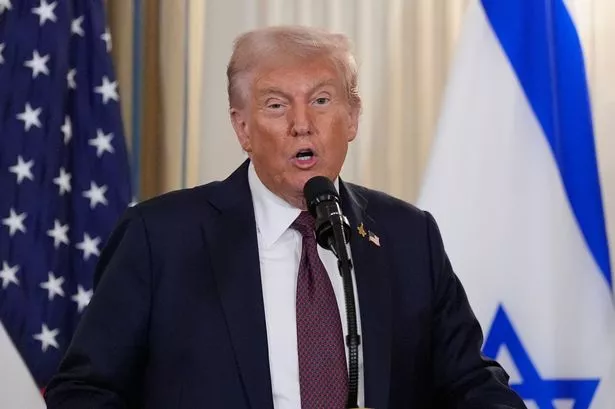President Donald Trump faced backlash on social media after mistakenly stating the year he began his presidential term during a joint press conference with Israeli Prime Minister Benjamin Netanyahu on Monday. The press event took place in the White House’s state dining room, where Trump discussed his ongoing efforts to address the conflict in Gaza.
During his remarks, Trump referred to Pakistani Prime Minister Shehbaz Sharif and Egyptian President Abdel Fattah el-Sisi, claiming both leaders supported his strategy to end the war in Gaza. “I mean, I would say it started around 2015 and then went into 2016 when the presidency began, officially began,” Trump said. His comments drew immediate criticism online, with users questioning his grasp on basic historical facts.
Several commenters noted the irony of Trump’s confusion, highlighting the significance of accurate timelines in political discourse. One user remarked, “Doesn’t know when his presidency began,” while another quipped, “When your timeline is as shaky as your tweets.”
Trump’s remarks came as part of a broader discussion on Middle Eastern peace initiatives. He emphasized Netanyahu’s “full backing to finish the job of destroying the threat” posed by Hamas. The president outlined a plan to establish an interim government in Gaza, which hinges on the disarmament of Hamas. He warned that any further provocations from the group would result in “destruction.”
In his address, Trump stated, “As progress is made toward achieving these goals, Arab and Muslim nations need to be allowed the chance to fulfill these commitments of dealing with Hamas.” He reiterated that if these nations are unable to manage Hamas, Israel would have “our full backing” to take decisive action against the group.
The proposed interim government is part of a comprehensive 20-point peace plan that Trump and Netanyahu discussed before the conference. “Today is a historic day for peace,” Trump declared, calling it “eternal peace in the Middle East.” He expressed optimism that all parties would accept the deal, with potential consequences for Hamas should they reject the proposal.
Should the agreement be accepted, the conflict would end immediately, with Hamas given a 72-hour deadline to release all hostages, both alive and deceased. In exchange, Israel would release 250 prisoners serving life sentences and 1,700 Gazans detained after the events of October 7, 2023, prioritizing women and children. The deal also includes provisions for the return of the remains of deceased individuals, stipulating that for each Israeli hostage’s remains returned, Israel would reciprocate with the remains of 15 Gazans.
The framework of the agreement emphasizes the importance of peaceful coexistence, offering amnesty to those within Hamas who agree to disarm and allow for safe passage for those wishing to leave Gaza for other countries.
As the situation evolves, the international community watches closely, with many hoping that this plan could pave the way for lasting peace in the region.
